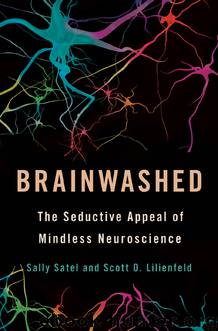Brainwashed by Sally Satel

Author:Sally Satel [Satel, Sally; O. Lilienfeld, Scott]
Language: eng
Format: epub
ISBN: 9780465037865
Publisher: Basic Books
PHILOSOPHERS have wrestled for centuries with the question whether moral responsibility can exist in a world in which our every action is predetermined by a cascade of events leading up to it. Scholars have yet to pin it to the mat, but as legal scholar Stephen Morse reminds us, the law does not require victory.47 To regard individuals as responsible agents, the law requires that they be able to use conscious thought to control their actions, know what they are doing, and understand the rules. That a long chain of physical causes precedes a crime does not undermine the law’s capacity, and duty, to blame and punish.
But should it? Clarence Darrow thought so. “Is Dickey Loeb to blame because out of the infinite forces that conspired to form him . . . he was born without [inner emotion]?” If he is, “then there should be a new definition for justice,” Darrow intoned.48 Many neuroscientists concur and advance a utilitarian model of justice dedicated solely to preventing crime through deterrence, incapacitation, and rehabilitation. What’s more, these scientists seem confident that as the general public becomes more familiar with the latest discoveries about the workings of the brain, it will inevitably come to accept their view on moral agency.
This, however, seems too extravagant a hope. The high degree of consensus across cultures regarding the value of fair punishment suggests that human intuitions about fairness and justice are so deeply rooted in evolution, psychology, and culture that new neuroscientific revelations are unlikely to dislodge them easily, if at all. This is not because people are immune to change. On the contrary, attitudes can shift over time, and recent history bears this out. Within the last two centuries alone, we have witnessed profound moral transformations, ranging from the abolition of slavery to legal protections against racial and sexual inequality and to the endorsement of same-sex marriage by millions. Yet these milestones of moral progress would not have come about at all but for the universal human hunger for fairness and justice.
For the sake of argument, though, let’s say that officials were to call a moratorium on blame next week. Would the universe eventually become a more humane place for criminals, as the neurodeterminists claim?49 A kinder domain, perhaps, for us all? Is it conceivable that victims’ attitudes could morph so drastically that a few Castrex pills for their rapists would seem like a reasonable way to handle the matter? This is ultimately an empirical question, but we suspect that the abolition of blame would have serious adverse consequences.
For one thing, a blameless world would be a very chilly place, inhospitable to the warming sentiments of forgiveness, redemption, and gratitude. In a milieu where no individuals are accountable for their actions, the so-called moral emotions would be unintelligible.50 If we no longer brand certain actions as blameworthy and punish transgressors in proportion to their crimes, we forgo precious opportunities to reaffirm the dignity of their victims and to inculcate a shared vision of a just society.
Download
This site does not store any files on its server. We only index and link to content provided by other sites. Please contact the content providers to delete copyright contents if any and email us, we'll remove relevant links or contents immediately.
The Art of Thinking Clearly by Rolf Dobelli(10457)
The 5 Love Languages: The Secret to Love That Lasts by Gary Chapman(9792)
Mindhunter: Inside the FBI's Elite Serial Crime Unit by John E. Douglas & Mark Olshaker(9324)
Becoming Supernatural by Dr. Joe Dispenza(8204)
Nudge - Improving Decisions about Health, Wealth, and Happiness by Thaler Sunstein(7694)
The Road Less Traveled by M. Scott Peck(7594)
Mastermind: How to Think Like Sherlock Holmes by Maria Konnikova(7324)
Enlightenment Now: The Case for Reason, Science, Humanism, and Progress by Steven Pinker(7306)
Win Bigly by Scott Adams(7184)
The Way of Zen by Alan W. Watts(6604)
Factfulness: Ten Reasons We're Wrong About the World – and Why Things Are Better Than You Think by Hans Rosling(4737)
The State of Affairs by Esther Perel(4712)
Gerald's Game by Stephen King(4642)
Man's Search for Meaning by Viktor Frankl(4586)
The Confidence Code by Katty Kay(4251)
Thinking in Bets by Annie Duke(4218)
The Healing Self by Deepak Chopra(3568)
Hidden Persuasion: 33 psychological influence techniques in advertising by Marc Andrews & Matthijs van Leeuwen & Rick van Baaren(3560)
The Worm at the Core by Sheldon Solomon(3486)
